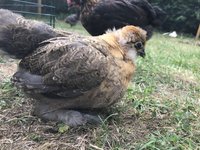- Jun 11, 2012
- 4
- 1
- 7
Went to let the chickens out this morning, and one of our hens was staying in the Coop. When she left the Coop for the run, she more or less flopped to the ground using her wings, coming to rest on the ground in the run. She seems alert, and generally healthy in appearance (good color in comb, good appetite, wide open eyes, etc.), but it is as if her legs/balance aren't working. When I set her in a towel-lined laundry basket, she started preening herself, but starts to fall backward when preening her tail feathers, as if her legs aren't working for stability. Her legs/feet are warm, but don't seem to be very strong, and I'm not seeing much movement out of her left foot/leg. 
Any ideas??
Thanks!

Any ideas??
Thanks!

